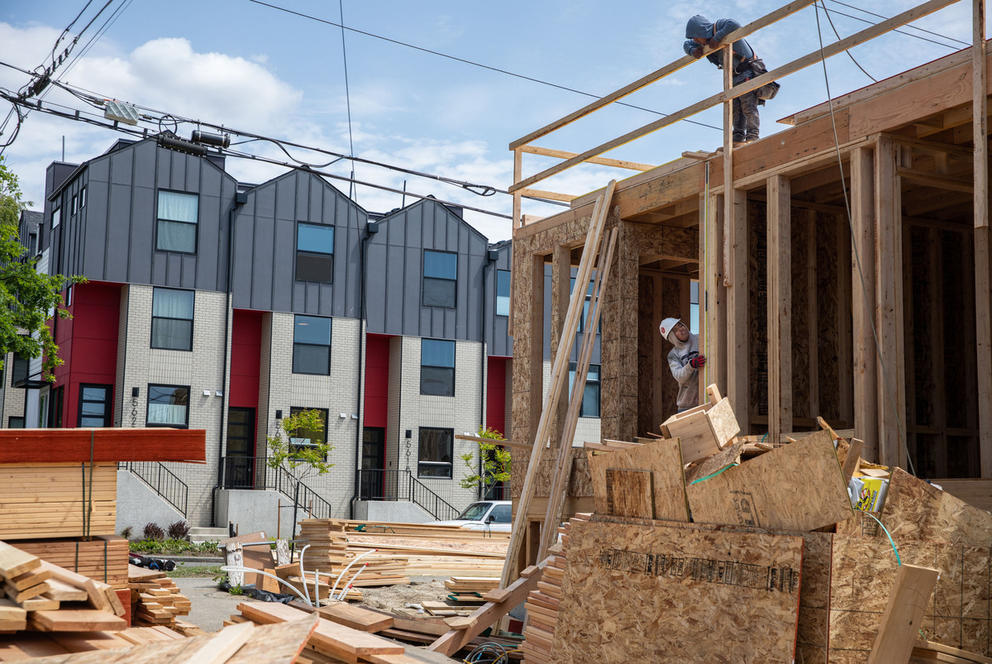Once the City Clerk approves the initiative petition, the campaign will have 180 days to collect and submit at least 26,521 valid signatures from registered Seattle voters to qualify for the November election.
If successful, the measure would levy a 5% “excess compensation” tax on employer payroll expenses for each Seattle-based employee paid over $1 million in annual compensation. In other words, an employer would pay a 5% tax on any dollar over $1 million in total employee compensation. Total compensation includes base salary, stock and bonuses.
That money would pay for Seattle’s newly created Social Housing Developer, the voter-approved public development authority that will build, acquire, manage and maintain permanently subsidized, mixed-income affordable housing. House Our Neighbors, which also spearheaded last year’s ballot measure to create the Social Housing Developer, expects the proposed tax to raise about $53 million annually.
The advocacy group estimates the public development authority would be able to acquire or build 2,000 units of housing over 10 years with that new tax revenue. The tax alone would not pay for that many units, but the funds could be used to help secure traditional bank loans, which is standard practice for housing development.
“I deeply believe that the implementation and strong funding of social housing is going to be the only way in my lifetime we’ll be able to meet our affordability needs at scale,” said Tiffani McCoy, House Our Neighbors’ policy and advocacy director.
McCoy continued, “Unless we implement housing as a human right, not a commodity, we’re going to continue seeing people unhoused and Black and brown people priced out of the city. I see this as one of the only ways we don’t just have cities for the wealthy with everyone else commuting in to serve them.”
In February 2023, Seattle voters passed a ballot measure 57% to 43% to create the Social Housing Developer.
While there was no official campaign opposing last year’s social housing ballot measure, some longtime affordable-housing advocates expressed concern and skepticism about social housing, arguing it duplicates existing work and would compete for the same scarce local and state funding sources. House Our Neighbors promised during last year’s campaign to seek new progressive revenue to fund the Social Housing Developer’s work.
Unlike the existing nonprofit and government-run affordable-housing model that provides subsidized housing primarily for people earning 0%-80% of the area median income, social housing developments are for people earning 0%-120% of area median income. Those at the higher end of the income spectrum pay higher monthly rents that help subsidize the lower-income units and ongoing operations costs.
While the goal is to create housing for people earning a broad range of incomes, Seattle’s social housing will not serve people exiting homelessness who require the mental health treatment, substance-use disorder counseling, jobs training and other services of permanent supportive housing. Instead, at the lowest end of the income spectrum, social housing is meant for people transitioning out of permanent supportive housing or out of a tiny-home village, as well as people higher up the income ladder who are priced out of the private rental market.
At a press conference Tuesday announcing the ballot initiative, developer Ben Maritz said Seattle’s social housing will likely primarily house people earning 60%-100% area median income, a challenging income level for the private market to serve with anything but studios and one-bedroom apartments. Maritz’s company builds privately-funded housing that rents for below-market rates and helped draft House Our Neighbors’ acquisition and construction estimates.
"I want to encourage my colleagues in the corporate world to view this cost as an expense that will be repaid,” said Maritz. “It will go directly to support housing for working people and families. Every company that is privileged enough to have people earning more than $1 million a year will also have employees who earn much less, and many of those employees will want to build a home and build a family near where they work."
Sharon Lee, executive director of the nonprofit affordable housing developer Low Income Housing Institute, and Karen Estevenin executive director of PROTEC 17, a union with members at the City of Seattle and King County, also spoke in support of the ballot initiative at the press conference Tuesday.
House Our Neighbors considered other progressive tax options for its ballot initiative effort, but settled on a payroll expense tax because the city has clear legal authority to levy it. There is precedent in the Jumpstart payroll expense tax passed by the City Council in 2020, which raises money for homelessness, climate resilience and small-business support.
“We don’t want the social housing developer to stagnate without money to show results,” said McCoy. “We went to the tried-and-true payroll tax, but focused on those companies that have the luxury of paying compensation in excess of $1 million.”
Seattle Metropolitan Chamber of Commerce CEO Rachel Smith told Crosscut that while her organization has lobbied for loosening zoning to increase housing density and supported recent city and county property tax renewals to fund affordable housing construction, it does not support House Our Neighbor’s proposed new payroll tax. The Chamber has opposed previous payroll taxes including suing to overturn the Jumpstart payroll tax when Seattle first created it, though the courts ultimately sided with the city.
“This tax proposal hits a familiar refrain: tax first, plan later, and hope for results,” wrote Smith in an email. “We’ve seen no concrete proposals — or much of anything – from the Social Housing Public Development Authority Board. Increasing the payroll expense tax for a third time in four years, expanding the tax to impact more than the 500 Seattle companies that already pay, and doing so with zero outreach to those impacted businesses is not the right approach.”
To start, House Our Neighbors expects the Seattle Social Housing Developer to use the tax funds for acquisitions instead of new construction. By buying existing apartment buildings, their hope is to get the new housing model up and running faster than going through the multi-year process of new construction. The Developer would likely begin working on new construction after four or five years.
The social housing model has been widely successful in Vienna, where upward of 60% of residents live in social housing that’s either owned or subsidized by the government. It is also broadly used in Singapore. In the U.S., Montgomery County, Maryland, has been experimenting with mixed-income subsidized housing, and Hawaii and California have nascent social housing efforts underway as well.
The Seattle Social Housing Developer is currently in start-up mode. It has a 13-person board of directors and is in the process of hiring its first CEO, which it expects to do this spring. The City of Seattle provided $20,000 and the state legislature provided another $180,000 for start-up costs.
Asked what would happen if the ballot measure did not succeed this fall, McCoy responded, “We do it again."
UPDATE: This story has updated with House Our Neighbors' revised projection of the number of units the tax can fund over 10 years. It has also been updated with information from House Our Neighbors' press conference and comment from the Seattle Metropolitan Chamber of Commerce.



